Kay Conder was only 34 years old when she and her husband of 13 years divorced, in 1984. She was left to raise six kids between the ages of 2-10 by herself. Now at 68, she discusses how she managed, how views within the church membership and leadership have changed over the years, and the lessons she’s learned along the way.
Did you ever think “why me?” And if so, what did you come up with?
I have thought about “why me” sometimes. Why can’t I have the perfect family? Why can’t I have a comfortable home and know how to make it pleasant? Sometimes it’s why me, why can’t I have all this stuff? But then I realize that’s not what my calling was here on this earth. It wasn’t to be rich and famous—to have millions of dollars.
I’ve always felt that anything Heavenly Father gave me was for my benefit, to help me learn and progress. I have a child who was born with medical needs who needed a lot of attention. I’ve always felt blessed with her. I could love her like no one else could. She could have been really rejected in another home. I’ve always felt it was a special calling for me to have her and be able to help her grow and become the woman that she is.
When it comes to my divorce, I think there’s something to be learned from a divorce. I learned what it’s like to be lonely, I mean really lonely. I learned how to be compassionate, and how to survive in different situations. There’s just always something for me to learn. I think I said sometimes, “Why do I have to do this?” But then I’d think: Patience. I really needed to learn patience, not just with other people, but patience with myself.
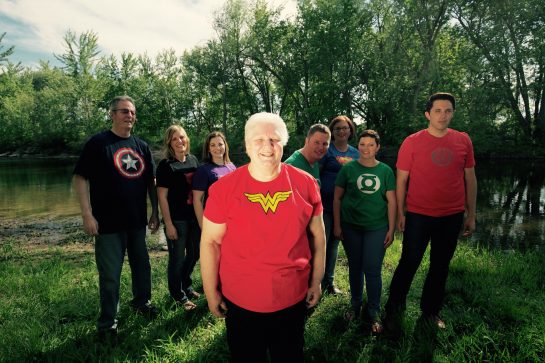
Photo by Tanya Pavlis
Was it as common in the 1980s to be divorced as it is now?
Not as much. I think that’s one reason I went to church because I wanted my children to have that stability they didn’t have in the home. Back then divorce was a little less prevalent, and so it seemed like there had to be something wrong. I felt that people were judging me or had judged me and I was not looked upon as favorably as I was before the divorce. Before, people had said, “Oh, you’re married and you have a family,” and now that I was divorced, it was, “What did she do to get divorced? Was it infidelity on his part? Is she going to make it?” People have all these questions, but they don’t want to ask—so it just builds up, you know? A lot of it was probably my imagination and they couldn’t have cared less. Everybody had their own family to worry about.
The church teaches you that you’re married for eternity and you should be able to work out all these problems. You can try hard, but if your spouse is not trying just as hard then there comes a time when you have say, “I’ve given it my all.” I think a marriage is a constant coming together of minds and if not, you need to have a compromise of some sort. When you feel the Spirit say that it’s better for the kids not to be exposed to so much fighting, yelling, and carrying on, it’s time to listen.
You lived in a very small Idaho town. How did that affect your experience around the divorce?
In a small town, people have more of a tendency to know each other and everybody’s business. On the other end, it was a small farming town and so everyone was busy with their farms or their kids and didn’t have as much time. I felt like everyone was talking about me, but in hindsight, it probably wasn’t true.
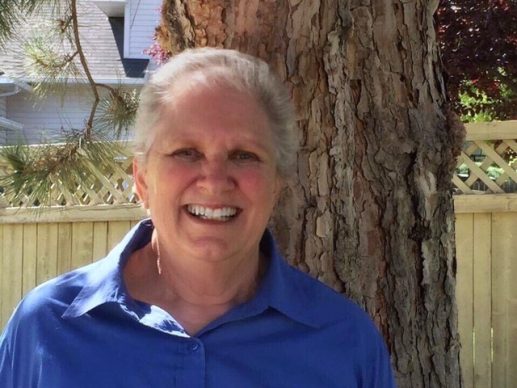
Photo credit: Lauren Lockett
What was it like raising six kids between the ages of 2-10 by yourself?
I never felt like there was enough time to divide and conquer. Being organized was a huge key. The hardest part was trying to balance everything and keep it within a small budget. I didn’t have a million dollars coming in. It was always a juggling act to make sure the kids had the necessities of life and to pay the bills. If you take all the concerns and responsibilities you have with one child and multiply it by six that’s how I was feeling. All of my kids had different personalities and quirks, which was its own set of challenges.
Sometimes I felt mentally and physically exhausted or drained. Between work and family, there was no time for me. It didn’t feel like there was a respite until people grew up and moved away. But then there’s a new set of worries.
What was it like being a single mom?
It was very frustrating. I didn’t feel like I had anybody to talk to. I felt like I didn’t have all the answers. If there was contention it remained between me and my children because I felt I should handle it alone, or at least give it a good shot.
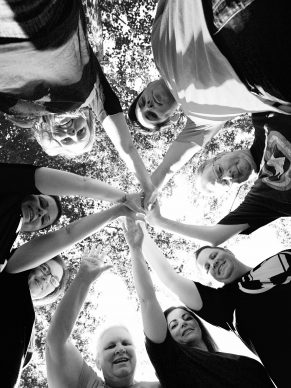
Photo credit: Tanya Pavlis
Did you ever wish you had time to date?
Yes and no. I dated a couple of guys and they just weren’t the ones. My self-esteem was so low after the divorce that I made bad choices when it came to dating. When I actually felt better about myself the opportunity never presented itself.
When I moved to Utah I tried to go to the singles dances, but it felt like a meat market. I probably didn’t give it a fair shot, but there seemed to be more girls than guys, and the guys who were there were trying to find someone younger and cuter, who didn’t have a lot of baggage. It wasn’t worth the effort. I felt like if Heavenly Father wanted me to have somebody he would put somebody in my path. In my Patriarchal Blessing it says I’ll have a tough life but in the end it will all work out, and so I just felt like this was part of my life.
Do you ever feel discouraged about never remarrying?
Yes. You know if you watch a movie or you read something and it really touches you? Those are the times when I miss having somebody there to talk with about it. There are times when I really want to snuggle and there’s nobody here. I just make my cat come lie by me and I pet him and he purrs, but it’s not the same.
Did you feel ashamed or like you had failed somehow?
I’ve always felt I failed somehow. This is the way it’s taught: you get married and you support your spouse and he should support you and you make this wonderful marriage. And even though they tell you it’s not always easy, you don’t really understand until you’re in the middle of it. You question: is it me? Is it him? I felt like it was always my fault. I didn’t support him. I didn’t do this or do that. Did I put too much pressure on him? It was always my questions about what I did wrong that made him fail.
I feel like I failed my children financially. I feel I failed them somewhat as a mother. I wasn’t always there when they needed to talk. And when I was ready to talk they weren’t. So there’s an emotional disconnect I think.
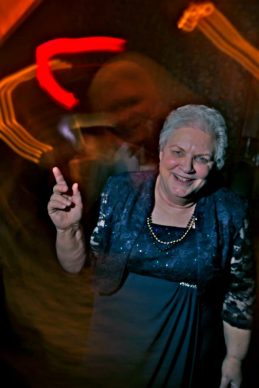
Photo credit: Tanya Pavlis
Can you list all of the jobs you’ve had since being a single mom?
I think so. I was an insurance nurse that did the physicals for insurance companies. I worked at the landfill, regulating the traffic, and where they could dump. I learned to drive a D-7 Cat. I recycled a lot, and it paid the bills. I mean, we’d make about $300-$400 a month just recycling cans and copper and whatever. I worked at Gooding Hospital until we moved and then I’ve been at the University of Utah ever since, for 29 years.
What did you do at the University of Utah?
I worked for Maternal Newborn Care. We took care of mothers postpartum/antepartum. We took care of babies. I worked in the Newborn Intensive Care Unit once in a while. Sometimes I went over to help Labor and Delivery, but I didn’t do the deliveries, I just took care of the babies. I was also a Charge Nurse.
What was the hardest part about being a working mom?
Trying to balance work hours with family, while also trying to make the family financially stable. You’re trying to save some money or get a little bit ahead, but then they need shoes, they need clothes, they need food, and they need a roof over their head. So you feel like you need to put more hours in to make that money, but then it’s taking away hours that you could spend with your family. Trying to find that balance was really hard.
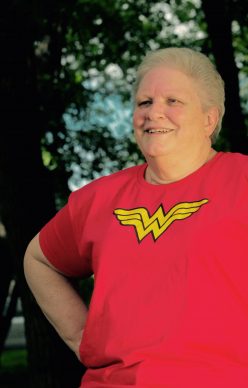
Photo credit: Tanya Pavlis
How did you parent while working such long hours?
How did I parent? Poorly [laughs]. Well, when my kids were younger and we had just moved to Utah, I worked in the evenings. I would try to call them every two hours to check up on them. We would have family prayer on the phone. On my days off, I tried to make it all about my kids. It helped me be more organized I think. Every day was somebody else’s day to be in charge. The kids learned how to cook and do different things they probably wouldn’t have learned if I had been a stay at home mom.
Do you feel like you missed out on anything by working?
Everything. Well, I felt like my ideal was to have this perfectly manicured house, have the laundry always done, have the meals planned, decorate for each holiday, be in the PTA or be a room mother, and being able to be with my family in the evenings and not be so tired that I couldn’t see straight. I wish I could have had more actual conversations instead of yes, no, I don’t care, go do what you want because I’m too tired to think about it right now.
I missed out being a leader for my girls at church. Maybe I would have been called to mutual or something like that where I would have had a little bit more influence. I might have been able to have more time for FHE or things like that, which could have given me an influence. There’s so many teaching moments at home and I missed a lot of those. I’m grateful that other people helped raised my kids to be the people they are.
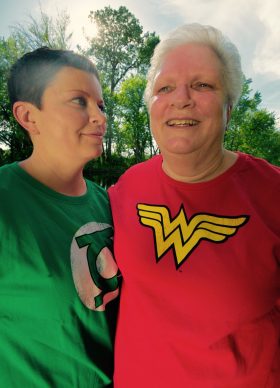
Kay and her daughter, Leslie. (Photo credit: Tanya Pavlis.)
What do you think or hope your children gained by having such a hardworking mom who sacrificed so much for them?
I hope they understand the value of work. That through prayer anything is possible. You can find some comfort in your Heavenly Father. I hope they gained a value of education. It seems like more and more people want an education, but it’s so expensive, so they give up on their dreams. I hope my kids never give up on their dreams. I hope they figure out what they want and go after it even if it takes a long time.
What are you most proud of when it comes to your career?
I’m proud that I’ve stuck with a job and a place for so long. I think there’s something to be said for stability and stick-to-it-ness. I’m proud that when I left the U of U, people cared that I was leaving. They cared about me and I cared about them. I’m proud that I was able to provide for my family. I felt like I gave really good care as a nurse, especially to the babies.
What are you most proud of when it comes to your children?
They have all grown up to be responsible. Everyone has had their trials, but in the long run they’ve found themselves in the gospel and found themselves as people. There’s always room for improvement and self-reflection—perpetual growth. They care about their community, the schools they attend, their children and setting good examples for them, their health, and that they go to church. I’m proud that they’re my children. When I talk about my children I don’t have to apologize. They are honestly good people and they seek after good things. They are kind and considerate of each other and of other people. They’ve given me wonderful grandchildren.
Your mother came to live with you and your kids the last 10 years of her life, how did you handle that along with everything else?
Sometimes it was very good, especially when she was in better health, because I knew my kids were in good hands. She would watch over them and try to guide them the best she could. Other times I got frustrated because every generation learns more than their parents, and so sometimes she’d want me to do something that just wasn’t my way. I felt like I had more psychology classes and sociology classes and more tools for compromising or coping. I believed that you always have to lead with love.
It wasn’t hard for me until the last five years when it was almost constant care for my mother. Instead of dividing my time in half with my family and work I now had to divide my time between my mom, my family, and work—along with whatever the church was asking me to do. But, like most women, I often took care of family before I took care of myself. It kind of got thin in places, but I’m grateful that the Lord gave me that strength.
What was the hardest part about going to church alone with your kids?
It seemed like back then all of the talks were about family, maybe not so much now. Activities for the ward were, “Bring your family.” I didn’t feel complete because I didn’t have a spouse and so it didn’t feel like a family. It’s hard to rein six kids in. Am I keeping my kids quiet enough? Have I taught them enough? I just felt judged a lot. It’s probably my internal insecurities; I’d often ask, “Is it worth taking them out or should I just stay in?” And then I would feel judged again, thinking people would say, “She can’t discipline her children.”
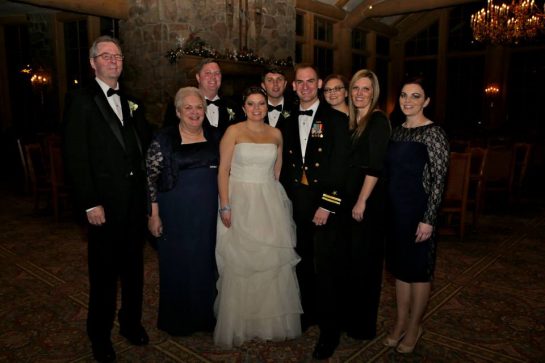
Kay at her daughter’s wedding
Did you ever miss having a priesthood holder in your home?
Yes. Lots. I couldn’t wait until Cody and Aaron, my sons, received the Aaronic Priesthood because it meant I had priesthood holders in my home. It’s not the same as having a Melchizedek Priesthood holder in your home who can bless your kids when they’re sick.
I think the leadership should come from a priesthood holder. He sets the example as far as having family prayer or calling on people or even Family Home Evening. Even though the mother is the nurturer, I feel like if she does it right, she would be the main support system and be able to help her husband be the leader. I don’t mean that she’s subservient. I think that’s part of our calling as a wife and mother that we support our children and we support our husband. In return they support us when we are doing things that are needful.
How did you rely on the priesthood leadership in the ward?
Sometimes I talked to them about my finances and got help financially and sometimes food-wise from the Bishop’s Storehouse. We called on my home teachers or the bishopric when we needed blessings. I would have talks with them while I was trying to gain my status back as a member. I also tried to listen to or read conference talks to help me have the knowledge I needed to tend to my children and to myself.
Did your testimony ever waiver?
I don’t think my testimony ever waivered. I think my physical being waivered. I’ve always known what was right from wrong and even when I was doing things that were wrong, I knew that I could repent I could come back and He was waiting for me, but it was up to me to make that penance.
How did you, or do you, strengthen your testimony?
I try to read the scriptures every day. I try to pray and I work on my prayers because I feel like they don’t even reach the roof sometimes. My prayers have always been constant—I may not kneel down and say everything all at once. I think bearing your testimony helps. I try to be prepared for Sunday and keep the Sabbath Day holy. I try to read the lessons that are going to be presented in Sunday School and Relief Society so that I can contribute, but also so I can be receptive to learning new ideas. Plus, I think it helps you to keep the Sabbath Day holy when you are prepared. It makes you feel the Spirit. I’ve tried to study about the Sacrament and I try to make that a more meaningful time in my life.
What advice do you have for single women or single moms?
Stay close to your Home Teachers and Visiting Teachers and when needed, your Bishopric. Never break those contacts, and let them know how important they are to you in your life. I feel like more and more the brethren have said, “Don’t worry about being single.” No matter what, the Lord will provide for us in this life or the next. Be prayerful. Always be prayerful. And study hard. Even if you’re not learning things like you do in school, you can always learn something new and different.
At A Glance
Name: Kay Lynn Conder
Age: 68
Location: Bountiful, Utah
Marital History: Divorced
Children: 6 children living 1 deceased. Holly: 43, Heidi: 42: Elisa: 41, Aaron 39, Cody 37, Leslie 35. (Lyle: Died a few hours after he was born.)
Occupation: Retired Registered Nurse
Schools Attended: Ricks College (Now BYUI), Imperial Valley College
Favorite Hymn: Families Can Be Together Forever
Interview Produced by Leslie Schwartz-Leeper
